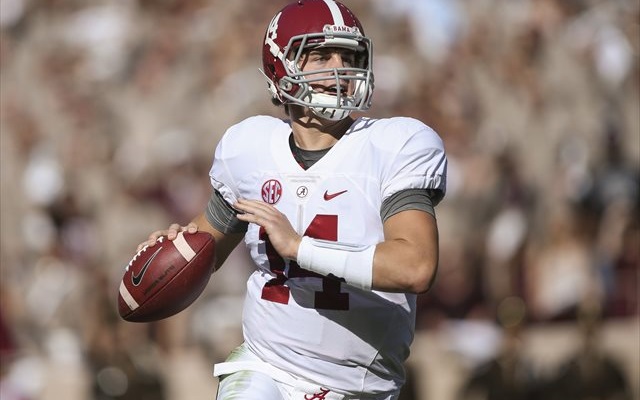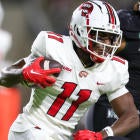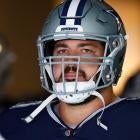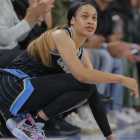Jake Coker lost the game but won the team. Alabama’s season changed largely because coach Nick Saban and offensive coordinator Lane Kiffin made a mistake by benching Coker against Ole Miss, planting a seed in a competitive player who thrives on being counted out.
The Crimson Tide's spot in the College Football Playoff can be traced back to Coker surprisingly not starting Sept. 19. He nearly rallied Alabama from a 20-point deficit in the loss to Ole Miss, a game that marked a turning point for Coker and the team.
“I think he won the team over with the way he competed in the game,” Saban said. “I think that was probably the most significant thing that happened for Jake. And I think rather than worrying about what he was supposed to do and trying to be perfect, he just went out and played for the first time.”
It’s the story of Coker’s life as a quarterback. Often counted out or overthinking his duties, he comes back more determined than ever. He’s the least-heralded quarterback in the College Football Playoff, but don’t mistake that for Coker being an insignificant part of Alabama’s second straight playoff trip.
“Everybody is talking about three quarterbacks. I think there are four,” said David Morris, Coker’s personal quarterback coach in Mobile, Alabama. “I think Jake has had as much to do with where Alabama is as any of the other three.”
Coker’s whole college career has been an uphill struggle. He lost the quarterback competition to Jameis Winston at Florida State. Coker patiently stuck through the 2013 national championship season, but he was determined to play and graduated early to transfer to Alabama.
Just like at St. Paul’s Episcopal School in Mobile, Coker was considered the heir apparent to replace quarterback A.J. McCarron at Alabama after transferring. Instead, Blake Sims won over his teammates and the job in 2014, relegating Coker to another year of backup duties.
Then, to the surprise of many, Coker didn’t start in Week 3 against Ole Miss, replaced by redshirt sophomore Cooper Bateman, who threw a pick in the second quarter. Coker came off the bench for a wild performance: 21-of-45 passing, three throwing touchdowns, two interceptions, and 58 rushing yards and one score on seven carries. Coker's fearless runs -- Kiffin calls it a “linebacker mentality" -- staked ownership to not just the job, but the team.
Michelle Spires, Coker’s mother, sat in the Bryant-Denny Stadium stands that night and heard even Ole Miss fans questioning why Coker wasn’t playing sooner.
“That was just a strange game,” Spires said. “I know there were some things going on internally at Alabama, just some things I really can’t tell you. I’m not sure I understand the whole story. I’ll tell you this: Jake was ready to go.”
Coker, an aw-shucks interview with reporters, clearly wasn’t happy.
“I was pretty angry,” he said. “But it was one of those things where I didn’t want to be a distraction to the team or anything like that. They knew I had to be unhappy about it, but I definitely didn’t act like it or complain about it or anything like that.”
Coker is middle-of-the-pack nationally in almost every passing category: 68th in yards per game (191.5), 44th in quarterback rating (139.41), 53rd in yards per attempt (7.4), 51st in touchdowns (17), and tied for 91st in interceptions (eight). His highest statistical measurement is 17th in completion percentage (65.7 percent).
In other words, Coker pretty much resembles a typical Alabama/Saban “game manager” quarterback -- except Saban waited longer than he ever has to settle on a starting quarterback. Playing next to star players, Coker doesn’t get nor seek much credit nationally. He isn’t asked to make as many plays with his arm as Deshaun Watson, Baker Mayfield or Connor Cook.
Coker’s fearlessness, though, is another story. It’s simply who he is.
Coker never met a slide he likes
Jake Coker was supposed to be your typical 6-foot-5, 240-pound lumbering quarterback. That’s what Coker’s friends and family often heard, to their surprise, when he came to Alabama.
It’s why they didn’t understand Bateman starting ahead of Coker based on Saban’s explanation that he wanted to surprise Ole Miss with a different element of speed and athleticism. (Alabama never really tried to use Bateman’s athleticism on designed plays in the game.)
Folks in Mobile remember the Coker who was a superb athlete and ran the ball a lot in a Wing-T offense during his junior year of high school. They remember his athleticism in basketball that earned him Mobile County’s Class 5A basketball player of the year and an invitation to the state’s high school all-star game. Mostly, they remember his competitiveness.
The story goes that in Coker’s junior year of high school, he came out of the stands during a student vs. faculty basketball game because the students were losing.
“It was supposed to be fun, but he couldn’t stand even losing that game,” said Steve Mask, St. Paul’s football coach. “He would dunk over his mother if he could. He just despises losing. That’s why he runs the way he runs that you see now. He’s not going to shy away from contact.”
That is putting it mildly. Coker has never met a slide he likes. His running style has been compared to a baby deer with wobbly legs that realizes it’s better at running than it thinks. (There’s irony in the deer comparison. Coker loves to hunt deer. After he takes a shot at the NFL, his mom thinks Coker will eventually take over the family business that breeds deer to sell hunts on their 900-acre and 700-acre pieces of land.)
Morris, Coker's personal coach since his junior year of high school, laughs at the deer comparison. He sees something else when Coker runs: Archie Manning.
“Go back and look at film of Archie,” Morris said. “I was looking at Jake running the other day and it hit me, ‘That reminds me of Archie.’ They’re both big guys. They’re both long-legged. They both do whatever it takes to get north-south.”
Still, whatever it takes could carry a price. Morris cringes at how Coker often ends his runs.
“I tell him all the time, ‘When you dive, you don’t have to hit the ground so hard,’” Morris said. “I’m proud of him when he makes himself fall to the ground before he gets a big hit, but the way he hits the ground so darn hard and violently, it worries me.”
Coker knows no other way. He grew up in an athletic and competitive family, the second-oldest of four kids, all of whom are athletes. Older brother Patrick played football at Air Force and is in his second tour of duty as a fighter pilot, this time in Turkey fighting ISIS, according to his mother.
Patrick got to attend Alabama’s games against Ole Miss and Georgia, the second of which was a surprise to Jake. “I have a picture of their hug afterward,” Spires said. “I thought Jake was going to cry. They were so happy. They have their own little way of communicating.”
Coker’s mom played tennis at the University of South Alabama and still plays competitively in Mobile. His grandfather was drafted by the Boston Celtics and New York Yankees but had to serve in Korea. His sister plays volleyball at Air Force. His younger brother is a high school sophomore who just got his first Division I basketball offer -- at Air Force, of course.
Coker is the 14th of 17 grandchildren, many of whom regularly played massive baseball and football games at the family farm or on the beach. “We’d have epic games -- whatever it takes -- and all the family would watch," Spires said.
So slide in a football game? That’s a foreign concept to Coker, even though Kiffin said Alabama wants its quarterback to run out of bounds or slide on running plays. Spires is used to her son’s style by now, but she silently hopes he will go out of bounds instead of taking on linebackers.
“In high school, A.J. (McCarron) was not fond of that and he would have a fit and used to tell Jake, ‘Hey, man, we don’t do that. You’ve got to slide,’” Spires said. “Jake goes, ‘I don’t do that.’ He’s going to try to scrap for every yard. I just know how he thinks. It’s not always the smartest thing to do, and I don’t think sometimes Coach Saban wants him to do it. But he’s pretty stubborn.”

Coker's mom to Tide assistant: 'Quit sneaking in the back door'
Like many kids in Alabama, Coker dreamed of playing for the Crimson Tide. But he was a three-star recruit in the Saban era of four- and five-star recruits, and other than Florida State, his early offers were limited to Mississippi State, Arkansas State, Duke and South Alabama.
Dameyune Craig had moved from South Alabama’s coaching staff to Florida State and developed a strong relationship with Coker. He committed to the Seminoles in June 2010 before his senior year of high school and stuck to his word, but not without immense pressure attached to a late offer from Alabama.
To this day, Coker’s mother speaks candidly about how upset she was with Alabama’s recruitment. Spires said Alabama assistant coach Jeremy Pruitt recruited Coker behind the family’s back after he committed to Florida State, causing her to give an “ass chewing” to Pruitt.
“I called Jeremy and said, ‘Quit sneaking in the back door. Do you understand the word ‘commitment’?” Spires recalled. “Jeremy got a little uppity with me but it didn’t last very long. From a mother’s standpoint, he was wrong. I still think he was wrong. I called him on it. He kept calling me back and I said, ‘What are you a sucker for punishment because I’m not going to cut you any slack? I don’t like what you did.’ Football is such a big business. It’s really not fun. These are kids and sometimes they get distorted by people who really just want a commitment and you never know why.”
Spires said she had a few sessions with Saban -- "Come to Jesus meetings," as she described them -- to discuss how Pruitt recruited Coker.
“I meant business because it got to be really traumatic,” Spires said. “Jake started wondering, ‘Did I make the right decision? What if, what if, what if?’ Jake made the decision to commit to Florida State and was totally comfortable with that. I put in my two bits with Jeremy, and by God, he goes to Florida State (to become defensive coordinator). I’m like, damn. So now he’s back at Alabama. It’s really kind of funny.”
For three years, Coker was a backup at Florida State. Entering 2013, most observers figured Winston, the future Heisman Trophy winner and eventual No. 1 NFL draft pick, would beat Coker for the starting job. That’s exactly what happened.
Spires said Florida State coach Jimbo Fisher made statements during Coker’s recruitment that in retrospect “were absolutely not true.” She declined to elaborate. She said she’s still friends with Fisher and praised him as a “great” quarterback coach.
But Spires said she and Fisher “went head to head” when he wouldn’t release Coker from his scholarship. “Jake was going to go a separate conference and wouldn’t play Florida State so I don’t know what the big beef was,” she said.
Coker remained for the 2013 season. Some of his best friends in life played on that Florida State team. During that season, Spires said she made Coker aware of an NCAA rule that would allow him to graduate early and have two years of immediate eligibility left at a new school.
Coker was Winston’s backup quarterback until suffering a torn meniscus in November 2013. Coker all of the right things and never became a distraction. Entering the BCS Championship Game that season, though, the hype surrounding Coker's skills grew to tall-tale proportions.
Florida State quarterback coach Randy Sanders said this to CBS Sports in January 2014: “Coker’s arm is kind of at a different level. Jameis has a very special arm, and this isn’t any knock against Jameis, but Jake’s probably the best I’ve seen in 25 years at throwing it.”
Lamarcus Joyner, then a star Seminoles defensive back, compared the Winston-Coker dynamic to what Florida experienced with Tim Tebow and Cam Newton. “You have two NFL guys sitting on one roster,” Joyner said in 2014.
As Coker worked toward early graduation, there was no question he would transfer to Alabama, which wasn’t sold on Blake Sims replacing McCarron. Fisher praised Coker when he left and described him as “one of the top three or four quarterbacks in America physically” but someone who happened to play behind No. 1, Winston.
The hype was out of control, especially when Sims struggled at Alabama’s spring game. Many fans and media members assumed Coker would automatically become the starter in 2014. The Johnny United Golden Arm Award and the Maxwell Award even named Coker to their preseason watch lists before Alabama named a starting quarterback.
Meanwhile, Coker’s head was spinning. He crammed to finish his classes at Florida State with a marketing degree in order to arrive in Tuscaloosa after spring practice.
“It was tough mentally, psychologically and physically,” Spires said. “He was going to a brand new program that was totally different from Florida State in terms of the structure and discipline and degree of difficulty. I think I underestimated and I think he probably underestimated the difficulty of the transition, not to mention he was going to compete against Blake Sims and they got to be really good friends. Blake was wonderful to Jake.”
Coker also simply needed to play again. He had gone years without meaningful game action and was rusty after season-ending knee surgery.
Morris remembers the first time Kiffin asked him about Coker. Morris shied away from projecting Coker’s skills but told Kiffin, “He’ll be one of the toughest kids you’ve ever coached. He is a guy that will fight, fight, fight from a competitive standpoint to the bitter end. It’s kind of what makes him tick.”
At the same time, Coker had to learn under Saban to find a healthy balance between toughness and recklessness, and Alabama needed to learn what it actually has in Coker. Maybe it took one last moment of doubt -- Coker’s benching against Ole Miss -- to unleash the player those close to Coker believed was always there. Mask, who stays in touch with Coker as St. Paul’s coach, said Coker finally felt after Ole Miss he didn’t need to look over his shoulder anymore.
Not starting that game “made him furious,” Mask said. “I think he felt like he had done enough to start. You could tell he finally said, ‘Enough is enough and I deserve to be the starting quarterback.’ For a while, he had become a football player trying to play football, and all of a sudden he became a kid playing football again.”
There’s authenticity to Coker, on and off the field. At a Cotton Bowl press conference this week, he wrote a faded ball cap and revealed he drives a white GMC Sierra pickup truck. What you see is what you get -- and although far from perfect, what Coker has done was good enough to help Alabama return to the national semifinals.
Count out Jake Coker at your own risk.
Follow and read more from Jon Solomon on Facebook and Twitter.




















